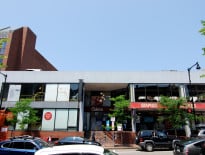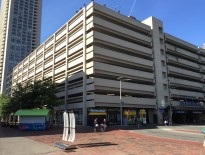
L.L.Bean Outsiders At Work event at the company headquarters in Freeport, Maine on June 7, 2018. (Photos by Whitney J. Fox for Jack Morton Worldwide and L.L.Bean)
Expansions by WeWork, its fast-growing rival Industrious and local operator WorkBar attest to the co-working industry’s role in extending the commercial real estate cycle in Greater Boston.
Coworking providers now lease 2.6 million square feet in Boston and Cambridge, according to Colliers International research, enough to fill both the Prudential and former Hancock towers and more.
The industry spans dozens of companies from industry leader WeWork to Boston-based Workbar, which is set to resume its expansion after adding a new investor from Japan. Coworking providers fill a role for landlords seeking to infuse buildings with startup energy, attracting freelancers, remote workers and growing firms that have rapid space requirements but are reluctant to sign a long-term lease.
“As long as there continues to be demand for flexible office space, and I don’t see that changing, you’re going to continue to see the large coworking companies focus on meeting that demand,” said Patrick Nugent, an executive vice president at JLL Boston who’s represented major coworking companies in recent expansions.
The coworking model has been embraced by landlords such as Related Beal and TIAA-CREF in striking deals with WeWork for large blocks of downtown space. But some industry sources question if coworking will be quick to feel the effects of a recession, leading to a shakeout that leaves landlords at risk.
“There’s an argument that if we go into a downturn, companies that have remote employees or five to 10 employees in a coworking space, and are cutting costs, maybe they’ll call them back to the office or let them go,” said Liz Berthelette, director of research at NAI Hunneman in Boston. “But WeWork says they are more insulated when there’s a recession because of the gig economy, there’s still going to be demand for those types of users.”
WeWork has been responsible for some of Boston’s largest office leases in the past year and now occupies 586,000 square feet in Greater Boston, according to research by Perry Brokerage.
After adding a 120,000-square-foot facility at 501 Boylston St. and plans to add 1,700 desks on four floors at 33 Arch St. later this year, WeWork will rent out nearly 12,000 desks in eight local properties. Another 97,114-square-foot location is planned at 40 Water St. in Related Beal’s Congress Square redevelopment, after WeWork finalized a 15-year lease in mid-June.
While WeWork did not respond to a request for comment on its local expansion plans beyond 33 Arch St., a potential new investor would give WeWork the firepower to accelerate its growth. WeWork is in talks with SoftBank Group for a multibillion-dollar investment, according to a Wall Street Journal report, potentially doubling its $20 billion valuation.
Coworking providers tend to infuse buildings with a startup atmosphere and trendy amenities, brokers say, which enhances the property’s overall appeal. And coworking providers have a built-in advantage over traditional office tenants as they expand: their space needs aren’t tied to expirations of existing leases.
“Opportunistic is the right word,” JLL’s Nugent said. “If they find the right piece of real estate with the right landlord and the right location, they’re going to act on it.”
WeWork typically creates a separate single-purpose corporation for each location and guarantees as little as 12 months of rent, said Robert Cleary, a senior vice president at Colliers International in Boston. That could leave landlords on the hook if WeWork closes an unprofitable location. And if rents escalate toward the end of a lease term, landlords that pay for substantial improvements upfront take on more risk.
“You’ve got a company that has a long-term lease that is heavily back-end loaded. The rents are very little at front and they get big at the end,” Cleary said. “You’ve got to hope that the tenant sticks around for the term of the lease, and it’s kind of a risk.”
But Nugent characterized the risks for landlords as no greater than leasing space to early-stage tech companies, which are driving much of the recent office absorption in Boston.
“Whether it’s a new tech startup or a new bank, the landlord is typically putting in upfront capital and they’re getting a revenue stream over a period of time,” Nugent said. “You’ve got to make sure the upfront investment meets the revenue stream and term.”
WorkBar Charts Next Expansion
Boston-based WorkBar has carved out a niche in the industry with a “hub-and-spoke” business model including both downtown and suburban locations. It owns eight locations and provides members with access to 12 others through partnerships with other providers.
Workbar promotes a community-based model which is designed to foster collaboration among members. Member boards list information on who’s working in an office on a particular day and their specialty, and luncheons and cocktail hours are designed to boost interaction.
“You can work in your space but also get an opportunity to branch out and meet others who are working there as well,” Murphy said.
Following an investment by Apamanshop Holdings of Japan, it’s planning to resume its expansion with additional locations opening by the end of 2018, said Bobby Murphy, head of business development.
New York-based Industrious is partnering with L.L. Bean to draw attention to its Boston expansion, having recently announced a third location at 100 Summer St. after opening centers at 855 Boylston St. in Back Bay and 22 Boston Wharf Road in the Seaport.
On Tuesday, Industrious will install an indoor-outdoor coworking space on the Greenway’s Wharf District Park, part of a three-day visit to Boston following a stopover in New York City. The promotion is part of L.L. Bean’s “Be an Outsider at Work” campaign extolling the benefits of outdoor workspaces.
Industrious has more than 40 locations nationwide and recently signed an agreement with Equity Office to partner on coworking spaces starting in Los Angeles, with potential expansion within Equity Office’s 42-million-square-foot portfolio.
This article has been updated to correct the address of Industrious’ Back Bay location at 855 Boylston St. A coworking space at 399 Boylston St. is owned and operated by Workbar.




 |
| 

